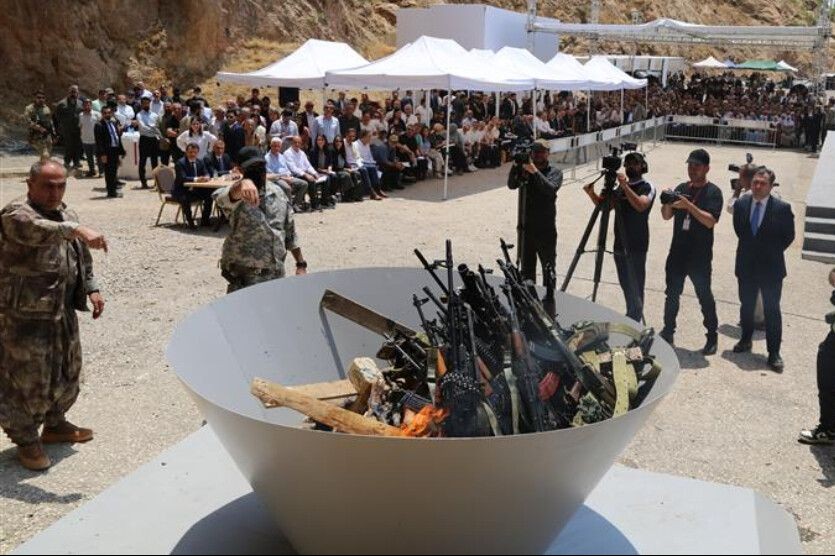'Credit card limit tax' dead, domestic-national industrial bubble damaged

Hakkı Özdal

Fotoğraf: TCCB
Indeed, the picture became clearer after President Tayyip Erdoğan's four-day visit to the United States (22-26 September) on the occasion of the United Nations General Assembly. This visit was accompanied by Finance Minister Mehmet Şimşek, and a significant part of the four days was devoted to hopes of progress in the 'investor' talks. There was no progress.
The second point of importance was the removal of some of the rough edges in the political and economic relations between the two countries, especially the CAATSA sanctions imposed by the US on Turkey since December 2020 (related to the S-400 'crisis'). The fact that Erdoğan did not attend the dinner hosted by Biden, despite it being announced in the programme for the last day, and returned to Turkey, shows that there was no progress on this issue either...
As you know, as soon as he returned, two things came to the fore:
1. The discourse that Turkey is the final target of the Israeli aggression.
2. The demand for a home front against [these] threats facing Turkey...
The expanded coalition framework, called the "home front", aims to enable different sections of capital and political elites (i.e. the social and political components of the palace regime and the People's Alliance) to come through the economic maelstrom with the least damage. To use the word that Erdoğan is using more and more often, in an atmosphere of "softening", in order to attract as many people as possible to his side or to neutralise and immobilise them by using the illusion of this so-called softening. As for those who 'remain', to crush them mercilessly by mobilising all kinds of demagogy, such as national survival and international threats.
The discourses of "Israel's target is Turkey" and "home front" are thus reinforced. It is the product of the efforts of the ruling elements to pass this process with the least damage under the uncanny conditions created by the disappointment in the USA against the global finance capital. The strategy of the regime, which is short of money and has little hope of solving this problem in the short term, is to use the promise of reform and the threat of repression together, but it is doing little more than showing that it is losing its potential to fulfil both the promise and the threat...
One of the indicators of this situation was that the robbery plan called "Defence Industry Fund", which was on the agenda along with the planned cut in credit cards, was withdrawn at the last moment while waiting for the approval of the People's Alliance deputies in the parliamentary vending machine.
The first thing that stands out is the distance that Şimşek and his team have put between themselves and this bizarre tax plan. In a live broadcast on NTV on Tuesday, when the debate was at its most heated, Mehmet Şimşek, as if to say 'this issue has nothing to do with us', said that the revenues generated by this plan would go directly to the defence industry, not to the budget, and quietly muttered the increasingly unconvincing excuse of 'our geographical location'.
So who was the 'owner' of this bizarre plan if not Şimşek, who is currently in charge of all money-laundering matters with a seal?
There is a clue in Şimşek's words: "This package will go entirely to the Defence Industry Fund. It is not a package to reduce the budget deficit. And he did not stop there: 'We cannot close our ears to criticism. Parliament will take it into account.
Who will be financed by this fund, which will be 'entirely' paid into the pool of money to be created by deductions from credit cards? Who are the barons of this 'defence industry'?
You can find out by looking at the list of Turkey's top taxpayers, the list of the 500 largest companies, the 'Teknofests' that the President hastens to open and the public speeches of the 'national defence industry' that are polished round the clock. The monopolistic unity of a few families and large conglomerates and their international partners, which also feed the suppliers and subcontractors scattered around them. The ruling class faction of the monopoly bourgeoisie, organically linked to the present regime, in which even the leader of the regime is directly involved. The real 'steel core'!
It should be recalled that the CAATSA sanctions imposed by the United States over the last four years, which were not lifted during the last visit, resulted in the Defence Industry Board (SSB) not being able to obtain export licences from the United States and being deprived of international loans.
After returning to the US, a tax bill prepared in the interests of this key power component was withdrawn in the face of reactions. For the time being, at least, the regime has not shown the courage to cut back the wage-earners in order to transfer a resource to the most refined bourgeois layers of the regime. Moreover, the pompous balloon of the 'national arms industry' has been damaged. Look, in one day at least 1 million people ran to the banks to reduce their card limits and said: 'No, I don't have money for the arms industry'!
Forwarding to the next article...
10 seconds remaining





Follow Evrensel